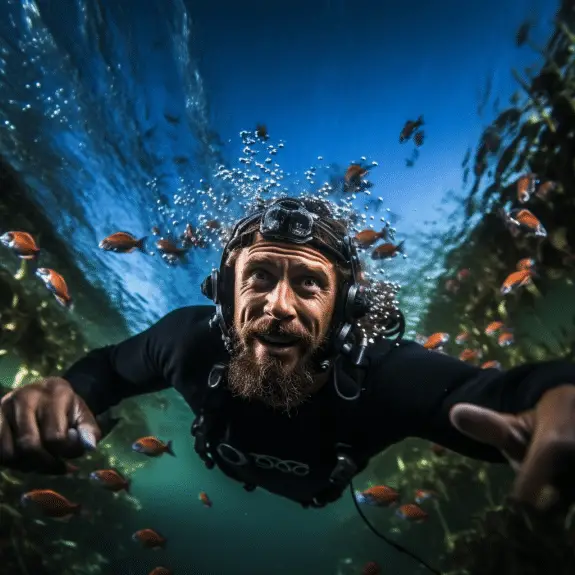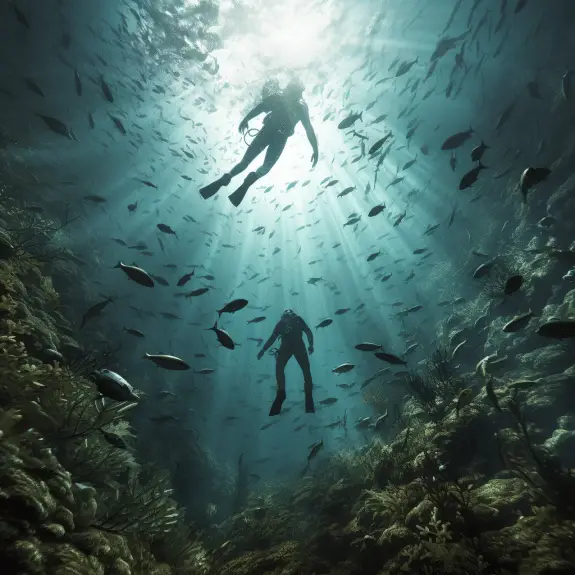Free diving techniques and equipment Free diving is a type of underwater diving. It relies on a diver’s ability to hold their breath. The diver explores the depths of the ocean. They do not use scuba gear or other external breathing apparatus.
This sport requires a combination of physical and mental preparedness, as well as safety training, to accomplish successful free dives. Free diving techniques include proper breathing, relaxation, and equalization to ensure a safe and enjoyable experience.
The benefits of free diving are numerous. It enhances lung capacity, improves cardiovascular health, and decreases stress levels. Additionally, it provides a unique opportunity to explore the underwater world in a peaceful and natural manner.
However, safety is paramount when it comes to free diving. The sport can be dangerous, and it’s crucial to follow safety guidelines and receive proper training to avoid accidents and injuries.
Key Takeaways:
- Free diving involves exploring the depths of the ocean without external breathing apparatus.
- Proper breathing, relaxation, and equalization are essential techniques for successful free diving.
- The benefits of free diving include improved health and a unique opportunity to explore the underwater world.
- Safety is crucial in free diving, and proper training and adherence to safety guidelines are necessary to avoid accidents and injuries.
- Free diving requires both physical and mental preparedness.

Exploring Free Diving Techniques and Equipment
Free diving, also called breath-hold diving, is an incredible sport that requires proper techniques and equipment to ensure safety and a successful underwater experience. In this section, we’ll explore the various free diving techniques, the necessary equipment, and some helpful tips to improve your skills and enjoyment.
Free Diving Techniques
To excel in free diving, it’s crucial to master certain techniques that allow you to hold your breath longer and dive deeper. The following are some popular free diving techniques:
- Breath-holding techniques: To improve your breath-holding capacity, you can practice diaphragmatic breathing, purging, and packing. Diaphragmatic breathing involves breathing deeply to fill your lungs, allowing more oxygen to go into your bloodstream. Purging is forcefully exhaling to get rid of any residual carbon dioxide, while packing involves inhaling extra air into your lungs to maximize oxygen capacity.
- Equalization techniques: Proper equalization helps relieve pressure in your ears and sinuses as you dive deeper. Some common equalization techniques include Valsalva, Frenzel, and Mouth Fill. Valsalva involves pinching your nose and blowing, while Frenzel involves using your tongue to regulate air pressure in your ears.
Free Diving Equipment
While free diving doesn’t require much equipment, having the right gear is essential for safety and comfort. Here are some must-have free diving equipment:
| Equipment | Description |
|---|---|
| Masks | A well-fitting mask that creates a tight seal around your face is necessary to prevent water from entering your eyes and nose. Look for low-volume masks that require less air to clear out any water. |
| Fins | Longer and narrower fins are ideal for free diving as they allow you to move through the water with ease and minimal effort. Closed-heel fins provide a more secure fit and better power transfer. |
| Wetsuits | Wetsuits help maintain your body temperature as you dive deeper and face colder water temperatures. Look for wetsuits made of neoprene with a thickness that suits the water temperature you’ll be diving in. |
Free Diving Tips
Lastly, here are some useful tips to enhance your free diving skills and experience:
- Always dive with a partner, so you can watch out for each other and provide assistance if needed.
- Start your free diving session with a few warm-up exercises to increase your heart rate and breathing capacity.
- Never dive past your limits or push yourself too hard, as this can lead to dangerous situations.
- Stay hydrated and well-fed before and after your diving session to ensure optimal physical and mental performance.
- Finally, remember to relax and enjoy the beauty of the underwater world, as free diving is not just about depth but also about immersing yourself in a serene and fascinating environment.
The Thrill of Free Diving: Records and Competitions
Free diving has emerged as a thrilling and daring sport that tests the limits of human endurance and skill.
Free diving has many records, as divers try to push their limits. The current world record for the deepest free dive belongs to Alexey Molchanov, who dived 130 meters in 2016. Molchanov is a Russian free diver who has set many world records and is highly regarded. Another impressive record is held by Tanya Streeter, who held her breath for 7 minutes and 29 seconds in 2002, setting the longest female breath-hold record. Free diving also has a world championship organized by the International Association for the Development of Apnea (AIDA), attracting the best free divers around the world.
| Year | Host Country | Champion |
|---|---|---|
| 2019 | Nice, France | Alessia Zecchini (Italy) |
| 2018 | Jeju Island, South Korea | Adam Stern (Australia) |
| 2017 | Roatan, Honduras | Alessia Zecchini (Italy) |
Alessia Zecchini is one of the most successful free divers in recent years, having won multiple world championships. In 2019, she won the championship in Nice, France, becoming the first woman to dive deeper than 100 meters in competition.
Free diving records and championships demonstrate the sport’s truly competitive nature, with accomplished divers pushing themselves to reach new depths and achieve new records. These events showcase the incredible skill and determination required to master this unique, exciting sport.

Conclusion
I think free diving is a great sport for exploring underwater. To do it safely, you need special skills and tools. But with practice, anyone can become good at it. People even compete in free diving, and there are championships that show off amazing achievements.
The thrill of breaking world records and reaching unbelievable depths makes free diving an impressive sport that continues to amaze and fascinate.
In my opinion, free diving is a sport that should be experienced by any adventurer looking for an extraordinary underwater adventure. So, if you’re up for a challenge, take the plunge and join the exciting world of free diving!
FAQ
What is free diving?
Free diving is a form of underwater diving that relies on breath-holding rather than the use of breathing apparatus.
What are the techniques involved in free diving?
Free diving techniques include breath-holding, equalization of the ears and sinuses, and efficient underwater movements.
What are the benefits of free diving?
Free diving offers numerous benefits, such as improved lung capacity, increased mental and physical discipline, and a unique connection with the underwater environment.
How important is safety in free diving?
Safety is of utmost importance in free diving to prevent accidents and ensure a enjoyable and risk-free experience. It involves thorough training, knowledge of one’s limits, and diving with a buddy.
What equipment is required for free diving?
Essential equipment for free diving includes a mask, snorkel, fins, and wetsuit. These help enhance comfort, visibility, and swimming efficiency in the water.
How can I improve my free diving skills?
To enhance your free diving skills, practicing breath-holding exercises, training regularly, and seeking guidance from experienced instructors can be beneficial.
What are some notable free diving records?
Free diving records include achievements such as the deepest dives, longest breath-holds, and longest distance swum underwater on a single breath.
Are there any free diving competitions?
Yes, there are prestigious world championships held for free diving, showcasing the talent and competitiveness of top free divers from around the world.
Is free diving suitable for everyone?
Free diving requires proper training, physical fitness, and awareness of safety protocols. It is advisable to consult with professionals and undergo medical assessments before engaging in this activity.
How can I get started with free diving?
To get started with free diving, it is recommended to enroll in a certified free diving course where you can learn the necessary skills and safety techniques from experienced professionals.
